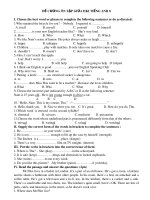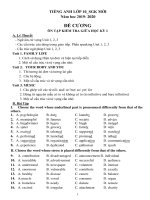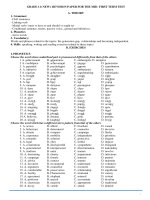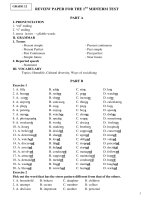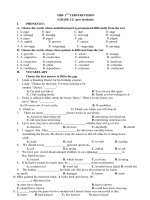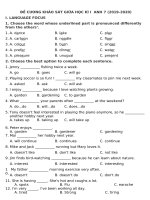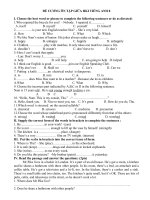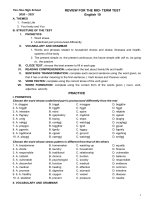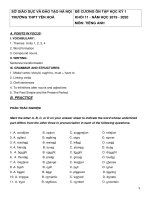Đề cương ôn tập giữa học kì 1 môn tiếng anh 12 ̣mới
Bạn đang xem bản rút gọn của tài liệu. Xem và tải ngay bản đầy đủ của tài liệu tại đây (138.94 KB, 10 trang )
MID- 1ST TERM REVISION
(GRADE 12) (new textbook)
I.
PHONETICS:
A. Choose the words whose underlined part is pronounced differently from the rest
1. A. page
B. face
C. date
D. map
2. A. arrested
B. mended
C. reserved
D. crowded
3. A. piece
B. peace
C. pie
D. please
4. A. capital
B. ancient
C. cancer
D. annual
5. A. devotion
B. congestion
C. suggestion
B. Choose the words whose stress pattern is different from the rest
1. A. provide
B. private
C. advise
2. A. supportive
B. connection
C. attention
3. A. congestion
B. employment
4. A. rural
B. urban
5. A. confidence
B. dependence
II.
VOCABULARY
C. achievement
C. crowded
C. reference
D. question
D. arrange
D. sacrifice
D. medicine
D. well-paid
D. conference
Choose the best answer to fill in the gap
1. Linda is thanking Daniel for his birthday present.
Linda: "Thanks for the book. I've been looking it for
months." Daniel: "
"
A. I'm glad you like it.
B. You can say that again
C. I like reading books.
D. Thank you for looking for it.
2. Daisy is talking to Mary about the house. Daisy:" What a lovely house you
have!" Mary: "
"
A. Of course not, it's not costly.
B. No problem.
C. I think so.
D. Thank you. Hope you will drop in.
3.
There are many
history books in our library.
A. American interesting old
B. interesting old American
C. old American interesting
D. interesting American old
4. Up to now, they have not made a
whether they will go or not.
A. decision
B. decisive
C. decidedly
D. decide
5. I suggest that John
the directions carefully before
assembling the bicycle. He doesn't want the wheels to fall off while he is riding down
a hill.
A. reads
B. read
C. to read
D. reading
6. We should avoid
personal questions.
A. ask
B.to going
C. asking
D. to ask
7. We have just visited disadvantaged children in an orphanage
in
Bac Ninh Province.
A. located
B. which locates
C. to locate
D. locating
8. If he hadn't wasted too much time, he
in his examination.
A. wouldn't fail
B. won't fail
C. wouldn't have failed D. would fail
9. The mother
her little son. She gives him whatever he wants.
A. spoils
B. damages
C. harms
D. ruins
10. Mike painted his bedroom black. It looks dark and dreary. He
a different color.
A. must have chosen
B. had to choose
C. should have chosen
D. could have been choosing
11. I
to play the piano for five months but I haven't been very successful at this.
A. learn
B. had learned
C. has learned
D. have learned
12. What
at 7 o'clock last night? I
a cooking book by Christine Ha.
A. are you doing ... am reading
B. were you doing ... read
C. were you doing ... was reading
D. did you do......read
13. England is a(n)
country, which my father has been to at least
A. English-spoken
B. spoken English
C. English-speaking D. speaking English
14. Look at Sophie. She's wearing an
skirt which she found in her
grandmother's
A. old-fashioning
B. fashion-olded
C. fashioned-old
D. old-fashioned
15. His sister
her leg when she was riding her scooter to school.
A. broke
B. breaks
C. is breaking
D. wasbreaking
Yesterday afternoon I the wall when the man
with a surprise package from uncle Andrew.
A. am painting ... came
B. have been painting....is coming
C. paint ... comes
D. was painting....came
17. By walking or cycling using cars, we can save energy and reduce air pollution.
A. and
B. instead of
C. for
D. but
18. For some time after
which happened near his house, Jack couldn't hear, and neither could he see.
A. an explosion disastrous
B. the disastrously explosion
C. the disastrous explosion
D. disastrous explosion
19. She didn't enjoy her first year at college because she failed to….....................her new friends.
A. come in for
B. go down with
C. get on with
D. look down on
20. Africa has always had a large migratory population because of war and
famine.
16.
A. a
B. an
C. the
D. Ø
III. MISTAKE CORECTION
Find out the mistakes in the following sentences
1. Poor in this area need more support on how to lead a better life and learn new life skills.
A
B
C
D
2. My uncle travels by the underground to work every day, but his wife goes to work by bus.
A
B
C
D
3. I am playing basketball with my sister when I fell down and broke my leg.
A
B
C
D
4. Two days ago we were buying our tickets for the concert which will be held on Friday night in
A
B
C
D
August.
5. I never listen to the radio. In fact, I don't have the radio.
A
B
C
D
IV.
WRITING
Mark the letter A, B, C, or D on your answer sheet to indicate the sentence that best
combines each pair of sentences in the following questions.
1. The criminal is believed to be living abroad.
A. The belief is that the criminal should be living abroad.
B. It believes that the criminal is living abroad.
C. There's a belief that the criminal should be living abroad.
D. It is believed that the criminal is living abroad.
2. Astrology greatly interests him.
A. He takes a keen interest in astrology.
B. He finds astrology very interested.
C. Astrology is the subject he enjoys the most.
D. He is very interesting in astrology.
3. "If I were you, I would never turn the television up late at night" the man told his
daughter.
A. The man wished his daughter didn't turn the television up late at night
B. The man ordered his daughter not to turn the television up when it's late at night.
C. The father said if he was his daughter, he would turn the television down at night.
D. The father advised his daughter not to turn the television up late at night.
4. We arrived at airport. We realized our passports were still at home.
A. It was until we arrived at airport that we realize our passports were still at home.
B. We arrived at airport and realized our passports are still at home.
C. Not until had we arrived at airport, we realized our passports were still at home.
D. Not until we arrived at airport, did we realize our passports were still at home.
5. You have just passed your exam. This makes your parents happy.
A. Having just passed your exam making your parents happy.
B. You have just passed your exam which it makes your parents happy.
C. You have just passed your exam makes your parents happy.
D. That you have just passed your exam makes your parents happy.
V. Mark the letter A, B, C, or D on your answer sheet to indicate the word(s) OPPOSITE
in meaning to the underlined word(s) in each of the following questions.
1. The employee's claim of being out with the flu did not seem very plausible because he
returned from sick leave with a deep tan.
A. tactful
B. vulnerable
C. inattentive
D. unreasonable
2. TEFL.com is a website which offers a job research facility to assist qualified students in
finding work.
A. help
B. aid
C. support
D. hinder
3. For urbanisation to be effective, the governments must address the social and economic problems that go
with it.
A. relate to
B. ignore
C. criticise
D. reduce
VI. Mark the letter A, B, C, or D on your answer sheet to indicate the word(s) CLOSEST in
meaning to the underlined word(s) in each of the following questions.
1. When being interviewed, you should concentrate on what the interviewer is saying or
asking you.
A. be interested in
B. be related to
C. pay all attention to
D. express interest to
2. Some 12th -grade students find sitting the entrance exam to be accepted into universities such
a daunting process that they become depressed due to the level of stress.
A. long-lasting
B. comforting
C. intimidating
D. intriguing
3.By now we all know that living in a damp and dirty condition is detrimental to our health.
A. fundamental
B. harmful
C. beneficial
D. encouraging
VII. READING
1. Read the passage and choose the best answer to fill in the gap
Nelson Rolihlahla Mandela (July 18, 1918 to December 5, 2013) was a nonviolence anti-apartheid
activist, politician and philanthropist (1)
became South Africa's first black president from 1994
to 1999. Becoming actively (2)
in the anti-apartheid movement in his 20s, Mandela joined the
African National Congress in 1942. (3)
20 years, he directed a campaign of peaceful, nonviolent
defiance against the South African government and its racist policies. Beginning in 1962, Mandela (4)
27 years in prison for political offenses. In 1993, Mandela and South African
President F.W. de Klerk were (5)
awarded the Nobel Peace Prize for their efforts to end the
country's apartheid system. For generations to come, Nelson Mandela will continue to be a (6)
of inspiration for activists worldwide.
On December 5, 2013, at the (7)
of 95, Nelson Mandela died at his home in Johannesburg,
South Africa. After (8)
a lung infection in January 2011, Mandela was briefly hospitalized in
Johannesburg to undergo surgery for a stomach ailment in early 2012. He was released after (9)
few
days, later returning to Qumbu. Mandela would be hospitalized many times over the next several years - in
December 2012, March 2013 and June 2013 - for further testing and medical treatment relating (10) his
recurrent lung infection.
(Text adapted from />1. A. who
B. whose
C. he
2. A. enjoyed
3. A. Since
B. involved
B. As
C. participated
C. For
4. A. sent
B. went
C. spent
D. used
5. A. jointly
B. mutually
C. bilaterally
D. again
6. A. cause
B. record
C. source
D. reason
7. A. age
B. birth
C. year
D. old
8. A. going
B. attaching
C. suffering
D. getting
9. A. a
B. many
C. a lot
D. lots
D. whom
D. take
D. When
10. A. with
B. in
C. to
D. from
2. Read the passage and answer the questions that follow.
The movement of people towards cities has accelerated in the past 40 years, particularly in the lessdeveloped regions, and the share of the global population living in urban areas has increased from one third
in 1960 to 47% (2.8 billion people) in 1999. The world's urban population is now growing by 60 million
persons per year, about three times the increase in the rural population.
Increasing urbanisation results about equally from births in urban areas and from the continued
movement of people from the rural surround. These forces are also feeding the sprawl of urban areas as
formerly rural peri-urban settlements become incorporated into nearby cities and as secondary cities, linked
by commerce to larger urban centres, grow larger.
The proportion of people in developing countries who live in cities has almost doubled since 1960
(from less than 22% to more than 40%), while in more-developed regions the urban share has grown from
61% to 76%. There is a significant association between this population movement from rural to urban areas
and declines in average family size.
Asia and Africa remain the least urbanised of the developing regions (less than 38% each). Latin
America and the Caribbean is more than 75% urban, a level almost equal to those in Europe, Northern
America and Japan (all are between 75 and 79%).
Urbanisation is projected to continue well into the next century. By 2030, it is expected that nearly 5
billion (61%) of the world's 8.1 billion people will live in cities. The less-developed regions will be more
than 57% urban. Latin America and the Caribbean will actually have a greater percentage of inhabitants
living in cities than Europe will.
Globally, the number of cities with 10 million or more inhabitants is increasing rapidly, and most of
these new ‘megacities’ are in the less-developed regions. In 1960, only New York and Tokyo had more than
10 million people. By 1999, there were 17 cities of more than 10 million people around the world, 13 of
these were in less- developed regions. It is projected that there will be 26 megacities by 2015, 22 in lessdeveloped regions (18 will be in Asia); more than 10% of the world's population will live in these cities, up
from just 1.7% in megacities in 1950.
(Text adapted from />1. What percentage of the world population living in urban areas in 1960?
A. About 33% B. 47%
C. 60%
D. 38%
2. According to paragraph 2, what contributes to increasing urbanisation?
A. old people in the cities
B. births in urban areas
C. people moving from rural areas
D. B and C
3. What was the urban share of developed countries in 1960?
A. 61%
B. 76%
C. 40%
D. 22%
4. The word ‘declines’ in paragraph 3 most closely means
.
A. gaps
B. decreases
C. expansions
D. moves
5. As in paragraph 4, what is the percentage of urbanisation in Latin America and the Caribbean?
A. more than 75%
B. less than 79%
C. more than 57% D. less
than 38%
6. The word ‘megacities’ in the last paragraph means
.
A. new found cities
B. cities in Asia
C. cities in less developed countries D. cities with 10 million people or more
7. How many cities in less developed regions had more than 10 million inhabitants in 1999?
A. 17
B. 10
C. 18
D. 13
8. Which is NOT true about the projection of urbanisation by 2030?
A. Europe will have more inhabitants living in cities than the Caribbean.
B. More than 57% of the population in less developed countries will live in cities.
C. 5 billion of the world population will live in cities.
D. Latin America will have more urban inhabitants than Europe.
9. This article was probably written around when?
A. Before 2015
B. In 2015
10. What could be the best title of the passage?
A. Urbanisation in Asia
C. Births in urban areas
C. 40 years ago
D. In 1960
B. Problems in urbanised areas
D. Global trends towards urbanisation
MID- 1ST TERM REVISION
(GRADE 12) (old textbook)
I. PHONETICS:
A. Choose the words whose underlined part is pronounced differently from the rest
1. A. fills
B. adds
C. stirs
D. lets
2. A. houses
B. rushes
C. goes
D. watches
3. A. cease
B. chase
C. increase
D. raise
4. A. believed
B. decided
C. supposed
D. concerned
5. A. determined
B. shared
C. agreed
D. trusted
B. Pick out the word that has the stress pattern different from that of the others.
1. A. household
B. behave
C. daughter
D. children
2. A. decision
B. important
C. another
D. personal
3. A. attract
B. person
C. common
D. verbal
4. A. noisy
B. signal
C. across
D. whistle
II. VOCABULARY
Choose the best answer to fill in the gap
1. Most doctors and nurses have to work on a
once or twice a week at the hospital.
a. solution
b. night shift
c. household chores d. special dishes
2. We enjoy
time together in the evening when the family members gather in the living room after a
day of working hard.
a. spending
b. caring
c. taking
d. doing
3. It is parents' duty and responsibility to
hands to take care of their children and give them a happy
home.
a. shake
b. hold
c. join
d. take
4. London is home to people of many
cultures.
a. diverse
b. diversity
c. diversify
d. diversification
5. John cannot make a
to get married to Mary or stay single until he can afford a house and a car.
a. decide
b. decision
c. decisive
d. decisively
6. A curriculum that ignores ethnic tensions, racial antagonisms, cultural
and religious differences is
pot relevant.
a. diversity
b. contacts
c. barriers
d. levels
7. She is a kind of woman who does not care much of work but generally
only with colleagues for
meals, movies or late nights at a club.
a. supposes
b. socializes
c. attention
d. discussed
8. I didn't think his comments were very appropriate at the time.
a. correct
b. right
c. exact
d. suitable
9. Someone
my bike! Now I’ll have to walk home.
A. steals
B. stolen
C. has stolen
D. had stolen
10. The number of the participants in the survey _
250 students for Oxford University.
a. are
b. was
c. were
d. have been
11. The grass was yellow because it
all summer.
a. does not rain
b. has not rained
c. had not rained
d. would not rain
12. Many people even wonder these days
_.
a. what marriage is
b. what is marriage c. what marriage was d. what was marriage
13. Peter said that he had lived in London four years
.
a. ago
b. before
c. later
d. then
14. The guest told the host that
.
a. I must go now
b. he must go now
c. he had to go now
d. he had to go then
15. The teacher told Joe
.
a. to stop talking b. stop talking c. stops talking d. stopped talking
16. - What an attractive hair style you have got, Mary!
a. Thank you very much. I am afraid
b. You are telling a lie
c. Thank you for your compliment
d. I don't like your sayings
17. - You look great in this new dress.
.
a. With pleasure
b. Not at all
c. I am glad you like it
d. Do not say anything about it
18. Mike : "Need a hand with your suitcase, Jane?" - Jane: "......................"
a. That's very kind of you b. Not a chance c. I don't believe
d. Well done!
19. Thanh: "Lan's the best singer in our school" - Nadia: "...................."
a. Yes, tell me about it
b. I can't agree with you more
c. That's ok!
d. Yes, please
20. Lucy: "You look really nice in that red sweater! - Sue: "....................."
a. How dare you! b. Thank you
c. I'm afraid so
d. Don't mention it
III. MISTAKE CORECTION
Find out the mistakes in the following sentences
1. The food that Mark is cooking in the kitchen is smelling delicious.
A
B
C
D
2. After George had returned to his house, he was reading a book.
A
B
C
D
3. Certain bats used their own sound to locate food and to avoid obstacles as they fly at night.
A
B
C
D
4. I live in the same town all my life and I do not want to move to another one.
A
B
C
D
5. Although it raining heavily, he went out without a raincoat.
A
B
C
D
IV. WRITING
Mark the letter A, B, C, or D on your answer sheet to indicate the sentence that best
combines each pair of sentences in the following questions.
Choose the sentence which has the closest meaning to the original one
1. "How beautiful is the dress you have just bought!" Peter said to Mary.
a. Peter promised to buy Mary a beautiful dress.
b. Peter said thanks to Mary for her beautiful dress.
c. Peter complimented Mary on her beautiful dress.
d. Peter asked Mary how she had just bought her beautiful dress.
2. I haven’t seen Alice for ages.
a. It’s ages since I last saw Alice.
b. It’s ages since I have seen Alice
c. It’s ages since I saw Alice
d. It has been ages since I last saw Alice.
3. "Hello, Mary!" Peter said. '
a. Peter said hello Mary.
b. Peter said Mary hello.
c. Peter told Mary hello
d. Peter greeted Mary.
4. Julie and Anne had not met each other before the party.
a. Julie and Anne got acquainted when they were at the party.
b. The party prevented Julie and Anne from meeting each other.
c. The party was the place where Julie and Anne could not meet each other.
d. Julie and Anne used to meet each other for the party.
5. "Why don't you ask the teacher for help?" Peter asked me.
a. Peter advised me to ask the teacher for help.
b. Peter recommended me not to ask the teacher for help. ,
c. Peter told me the reason why I did not ask the teacher for help.
d. Peter suggested that he should ask the teacher for help.
V. Mark the letter A, B, C, or D on your answer sheet to indicate the word(s) OPPOSITE
in meaning to the underlined word(s) in each of the following questions.
1. I could see the finish line and thought I was home and dry.
A. hopeless B. hopeful
C. successful
D. unsuccessful
2. This tape stry has a very complicated pattern.
A. obsolete
B. intricate
C. ultimate
D.appropriate
3. The last week of classes is always very busy because students are taking examinations, making applications
to the University, and extending their visas.
4. This is the instance where big, obvious non-verbal signals are appropriate.
A. situation
B. attention C. place
D. matter
5. The teacher gave some suggestions on what could come out for the examination.
A. effects B. symptoms C. hints D. demonstrations
VI. Mark the letter A, B, C, or D on your answer sheet to indicate the word(s) CLOSEST in
meaning to the underlined word(s) in each of the following questions.
1. There is growing concern about the way man has destroyed the environment.
A. ease
B. attraction C. consideration
D. speculation
2. We offer a speedy and secure service of transferring money in less than 24 hours.
A. uninterested
B. unsure
C. slow
D. open
3. She was brought up in a well-off family. She can’t understand the problems we are facing.
A. poor
B. wealthy
C. kind
D. broke
4. Affluent families find it easier to support their children financially.
A. Wealthy B. Well-off
C. Privileged D. Impoverished
5. My first impression of her was her impassive face
A. emotional B. respectful C. solid D. fractious
VII. READING
A. Fill in each numbered blank with one suitable word or phrase.
There are many reasons (1) taking regular time with our family is important:
It (2)
a place to listen, teach, learn, and (3)
ourselves freely and safely. It provides (4)
to discuss family joys, issues, and problems. Family members can practice skills in a non-threatening (5)
.Families are a (6)
part of our society and the fabric of our communities - we spend (7)
time
together to get our feelings (8)
belonging, our values, support and understanding. It helps (9)
family members together and feel safe in today's world where (10) can lead to family disintegration
1. a. that
b. why
c. when
d. which
2. a. creates
b. invents
c. develops
d. makes
3. a. think
b. show
c. express
d. say
4. a. opportunities b. conditions
c. situations
d. circumstances
5. a. air
b. nature
c. space
d. atmosphere
6. a. attractive
b. real
c. deep
d. basic
7. a. a
b. an
c. the
d. no article
8. a. in
b. of
c. on
d. for
9. a. keep
b. keeping
c. kept
d. with keeping
10. a. push
b. press
c. pressure
d. pull
B. Read the passage carefully and choose the correct answer.
In the past, both men and women were expected to be married at quite young ages. Marriages were
generally arranged by parents and family, with their children having little chance to say no in the matter. In the
past it was not surprising to find that a bride and groom had only just met on the day of their engagement or
marriage.
In modern Vietnam, this has changed completely as people choose their own marriage-partners based on
love, and in consideration primarily to their own needs and wants. Moreover early marriage is quite illegal.
The traditional Vietnamese wedding is one of the most important of traditional Vietnamese occasions.
Regardless of westernization, many of the age-old customs practiced in a traditional Vietnamese wedding
continue to be celebrated by both Vietnamese in Vietnam and overseas, often combining both western and
eastern elements. Besides the wedding ceremony, there is also an engagement ceremony which takes place
usually half a year or so before the wedding. Due to the spiritual nature of the occasion, the date and time of the
marriage ceremony are decided in advance by a fortune teller. The traditional Vietnamese wedding consists of
an extensive array of ceremonies: the first is the ceremony to ask permission to receive the bride, the second is
the procession to receive the bride (along with the ancestor ceremony at her house), the third is to bring the
bride to the groom's house for another ancestor ceremony and to welcome her into the family, then the last is a
wedding banquet. The number of guests in attendance at these banquets is huge, usually in the hundreds.
Several special dishes are served. Guests are expected to bring gifts, often money, which the groom and bride at
one point in the banquet will go from table to table collecting.
1. In the past,
.
a. Vietnamese couples were free to make a decision on the marriage
b. Vietnamese marriage was decided by parents and family
c. getting married at an early age was not allowed
d. parents had no right to interfere their children's marriage
2. In former days, the fact that a bride and groom had only first met just on the day of their engagement or
marriage was
.
a. surprising
b. popular
c. uncommon
d. strange
3. Which sentence is referred Vietnamese modern marriage?
a. Most young people do not have their marriage based on love.
b. All marriages are arranged by parents and family.
c. Marriage is quite westernization.
d. Couples do not get married at quite young ages.
4. According to the passage,
.
a. Oversea Vietnamese people do not like to organize a traditional wedding
b. There is an engagement ceremony which takes place usually half a year or so before the wedding
c. Many of the age-old customs practiced in a traditional Vietnamese wedding do not exist nowadays
d. Vietnamese people never ask a fortune teller the date and time of the marriage ceremony
5. Which does not exist in a Vietnamese wedding party?
a. firecrackers
b. guests
c. dishes
d. gift

